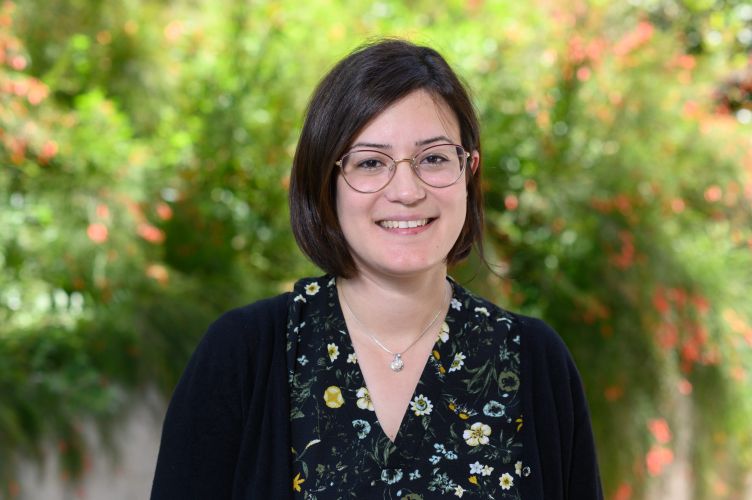Meet Dr. Dima Azaiza Dabbah, Postdoctoral WIS-MPG Fellow

Dr. Dima Azaiza Dabbah’s professional and personal journey to the Weizmann Institute of Science is inspiring, to say the least. Her impactful work within the Department of Molecular Chemistry and Materials Science, vast involvement across the Weizmann campus, academic excellence, and pursuit of science for the future of humanity, embodies the Weizmann spirit.
We had the opportunity to speak with Dr. Azaiza Dabbah and hear her story. See the interview below.
What drew you to the Weizmann Institute of Science?
I was drawn to the institute based on a recommendation from a lecturer I had worked with during my previous role as a teacher. He spoke highly of the institute’s unique focus on fundamental research and the exceptional quality of the work being done here.
What are you researching now?
My current research focuses on the electrochemical conversion of carbon dioxide into carbon monoxide and other valuable products, using inorganic catalysts (polyoxometalates) that incorporate metals similar to those found in natural enzymes involved in this process.
What about the Weizmann-MPG program that made you want to apply and what are you looking forward to?
I see the Weizmann-MPG program as a unique opportunity to collaborate between two laboratories from different research fields. This interdisciplinary approach not only enhances networking but also fosters the development of innovative research ideas. I am eager to learn from both labs and to integrate their expertise in order to produce more comprehensive and impactful scientific findings.
Kindly share your proposed research for your postdoctoral studies.
My proposed postdoctoral research aims to develop a novel strategy for introducing amino groups into organic molecules by utilizing nitrogen gas (N₂) as the primary nitrogen source. By combining electrochemistry with transition metal catalysis, I seek to activate N₂ under mild conditions for efficient and sustainable amination. This approach has the potential to revolutionize synthetic chemistry, with applications in pharmaceuticals, materials science, and agrochemicals.
How can international collaborations influence your work?
International collaborations could provide access to essential techniques that would deepen our understanding of the mechanisms behind the catalytic processes we are studying, while also expanding my professional network and fostering valuable connections in the scientific community.
How does the Weizmann Institute’s curiosity-based and multidisciplinary approach impact on your scientific research?
Working at the Weizmann Institute offers an ideal environment to refine my research, engage in meaningful scientific exchange, and contribute to advancing knowledge. The Institute’s strong emphasis on multidisciplinary programs and its global collaborations creates valuable opportunities for high-quality research and the development of innovative ideas. This dynamic setting fosters both scientific growth and impactful international partnerships.
How does your work relate to the IES (Institute for Environmental Sustainability)?
My current research focuses on reducing atmospheric carbon dioxide by converting it into valuable products and green fuels, contributing to a more sustainable future. This work aligns with global efforts to combat climate change and is supported by the IES, which promotes innovative research in environmental sustainability. As a result of this research, I have successfully published two significant scientific articles, secured two patents, and launched a startup aimed at translating this fundamental science into industrial applications.
What does it mean to be an IES fellow?
In my view, being an IES Fellow comes with the responsibility to both learn and share knowledge daily, focusing on research that positively impacts our world and promotes sustainability. It is essential to educate and inspire the next generation by highlighting the importance of scientific research in addressing global environmental challenges. Through lectures and outreach, we can emphasize the vital role of sustainability-focused research in creating a better future for our planet.
Any advice for aspiring scientists?
My advice to students and early-career researchers is to embrace curiosity and never be afraid to ask bold questions. Scientific progress often comes from persistence, especially when things don’t go as planned— failure is part of the process. Seek out mentors, stay open to collaboration, and remember that your research can contribute to solving real-world challenges, especially in areas like sustainability and climate change. Keep learning, stay passionate, and believe in the impact your work can make.
Other comments?
The Weizmann Institute has truly been a turning point in my life. I come from a Muslim Arab village in northern Israel, where I had big dreams but limited access to scientific resources and opportunities. At the Weizmann Institute, especially through the IES program, I met people who believed in me, supported my journey, and encouraged me to work hard and pursue my goals. That support made all the difference— it opened doors I never imagined and gave me the chance to choose a career path I once thought was out of reach.
Photo taken by the Weizmann Photography Unit